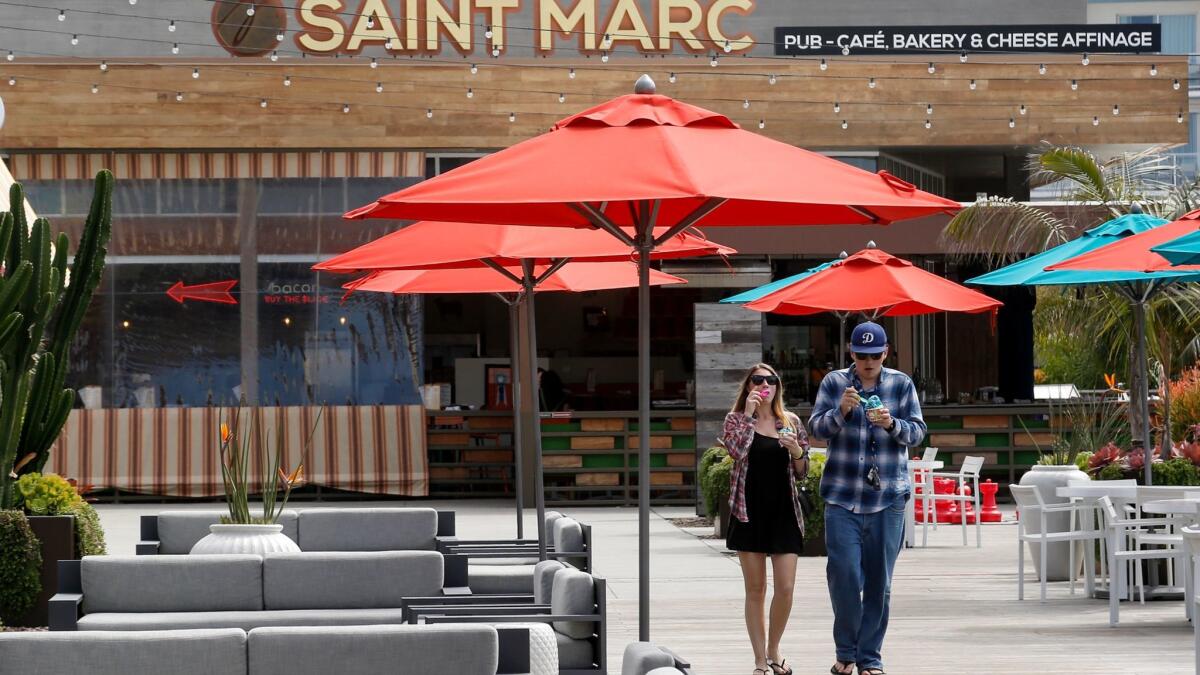After a waiter’s demand for ‘proof of residency,’ familiar echoes of discrimination take on new resonance

Diana Carrillo was accustomed to waving off the disdain that invaded her life as a Mexican American, she said. But after a waiter at an upscale Huntington Beach restaurant asked her dining party for “proof of residency,” the 24-year-old Irvine resid
The wary eye of a salesclerk. A snide comment made by a passerby. A remark about her mother’s uneven English.
Diana Carrillo was accustomed to waving off the disdain that invaded her life as a Mexican American, she said.
But after a waiter at an upscale Huntington Beach restaurant asked her dining party for “proof of residency,” the 24-year-old Irvine resident said, she decided to go public.
Her Facebook post and the ensuing media coverage of her experience struck a nerve across the nation, with thousands excoriating the restaurant in online comments and flooding its Yelp page to write scathing reviews.
“Come here if you want to be discriminated against!” “Better make sure you bring your passport/birth certificate.”
Carrillo, who works for a mortgage broker company, said she wanted to share her story to hold the restaurant accountable.
Such affronts are familiar for people of color, woven throughout their everyday lives. But these episodes have taken on new resonance in a political climate that is increasingly divided.
The last few months have been marked by threats to Jewish community centers and temples across the country as well as hate letters targeting mosques and Muslim centers. California police have created new programs to deal with hate crimes and hate speech. Though it’s unclear whether there has been an increase in hate crimes, officials said such incidents are getting more attention and residents are demanding action from police.
Some say President Trump’s election has emboldened this behavior — or at least left people feeling more vulnerable. But at the same time, the tense political climate has encouraged more people who feel victimized to speak out — as in the case of Carrillo.
In January, Asian Americans Advancing Justice launched a national effort to track hate crimes against Asian people. They’ve received more than 80 reports in just two months, said John C. Yang, a vice president of the organization’s Washington, D.C., office. The reports have come in from every region of the country.
In New York, an Asian man born in Manhattan reported he was shoved and called a racial epithet without provocation. A man boarding a plane in Chicago asked a Pakistani Indian couple whether they had a bomb in their bag. A Minnesota Hmong family’s garage and minivan were vandalized with racial slurs.
Recently, retired accountant Lalitha Pillalamarri was returning home from her daily afternoon walk around Bel Air, Md., when an elderly white neighbor beckoned.
“She asked, ‘Are you Muslim?’” Pillalamarri recalled. The woman then warned her that Muslims are terrorists.
Pillalamarri, who is Indian American, has been walking the same route for many years. Never has the neighbor approached her with such a question.
“People feel bold enough to let their prejudice come out now,” Pillalamarri said.
People feel bold enough to let their prejudice come out now.
— Lalitha Pillalamarri
Carrillo said she faced hostility well before the election but nothing like what happened at the Huntington Beach restaurant. The motives of the waiter remain unclear. His identity has not been made public, and he could not be reached for comment.
Carrillo complained about the waiter’s behavior to management at Saint Marc, a pricey cafe near the ocean where patrons can order coffee-rubbed bacon from a “bacon bar.” It responded by firing the waiter.
“The views of our former employee are not in line with that of Saint Marc, nor will we allow any current or future employee to treat any guests this way in our establishment,” the restaurant said in a statement. It announced on its Facebook page that 10% of the past weekend’s revenue was donated to an advocacy group for Orange County immigrant youth on behalf of Carrillo.
Carrillo has replayed the March 11 incident in her head, questioning herself on the details. “Did I misinterpret something?” she said. “No. There is no room for misinterpretation.”
She said the manager told her that the waiter had told him he meant the comment as a joke, but she doesn’t buy it.
She said the waiter approached the table without a smile.
“He didn’t introduce himself or welcome us to the restaurant,” Carrillo said. “He just asked us for proof of our residency, looked at our IDs and walked away.”
She read comments on social media that challenged her story, suggesting that the waiter was actually asking if they were Huntington Beach residents so they could receive a discount.
“There is no way,” Carrillo said. “That didn’t happen.”
Kent Bearden, senior director of operations for Saint Marc, said the restaurant does not have a discount policy for Huntington Beach residents but does offer deals to patrons of a nearby hotel.

Bearden said he investigated the incident himself and that it began when the women ordered alcoholic drinks. The waiter, he said, asked for proof of residency. As the women pulled out their identification, the waiter added, “I just need to make sure you live here.”
Bearden spoke to the waiter about what happened but was not satisfied with his story, adding his behavior went against the restaurant’s employee handbook.
“I can’t confirm with certainty any more than you can because I did not witness it,” he said of the incident.
Usually, Carrillo said, her encounters with racism have been subtle.
“You walk into a place and people look at you and kind of judge you on your appearance, your skin color,” she said. “You can just feel it.”
Sometimes people make remarks when she and her family speak Spanish to each other in public.
“Illegals need to just stop jumping the border,” someone once said within earshot of her family a few years ago.
She’s tried to not let it bother her, most times ignoring glances, eye-rolling or other gestures. She says she knows she may not experience as much as darker-skinned friends.
Carrillo’s mother, for instance, has received the brunt of people questioning her American status.
Guillermina Carrillo, 52, came to the United States from Mexico more than 30 years ago. She’s been a citizen for nearly two decades, juggling two jobs while raising her four daughters alone.
Years ago, she would take the family to swap meets, scouring the tables for books on learning English. She pored over them and recited words.
“Did I say that right?” she would ask.
Now she works as a security guard at the Segerstrom Center for the Arts, where she’s been employed for more than 20 years, and has a second job pressing clothing at a manufacturer for an upscale women’s clothing brand. She works more than 12 hours a day, six days a week.
Just a few months ago, one of her mother’s co-workers commented on her English.
“You’ve been here for over 30 years and your English is still broken,” the colleague said.
“My mom has raised four girls by herself,” Diana Carrillo said. “She put herself through school and learned English and assimilated and contributed to society. But you still get people telling you that you don’t belong here.”
Patrons at Pacific City, where Saint Marc is located, shared mixed feelings about the incident.
Nancy Tolbert of Westminster, a regular at the oceanfront shopping complex, said she’s curious to try Saint Marc.
As a Latina, she said she knows “that I don’t fit the blond beach stereotype of this area, but really, this is a comfortable environment. You don’t need to follow societal norms. We are in California, after all. You can speak freely, regardless of your culture. This is an accepting place.”
[email protected] | [email protected] | [email protected] | [email protected]
Times staff writers Corina Knoll and Sarah Parvini contributed to this report.
ALSO
This tiny California town’s battle over ‘sanctuary city’ status started long before Trump
More to Read
Sign up for Essential California
The most important California stories and recommendations in your inbox every morning.
You may occasionally receive promotional content from the Los Angeles Times.














